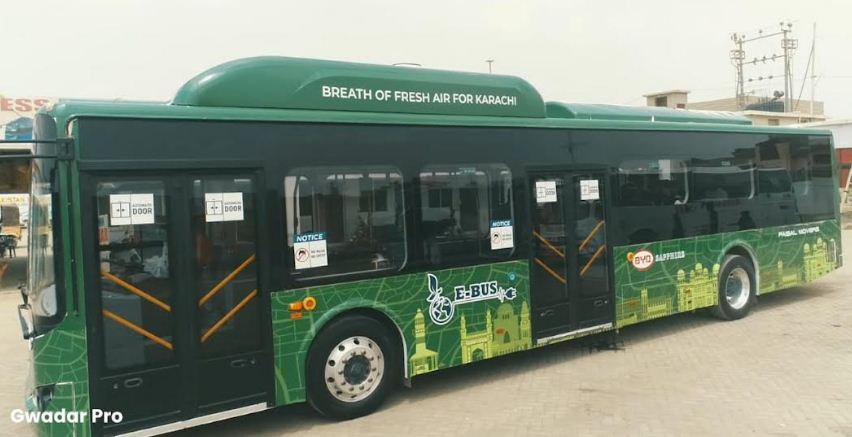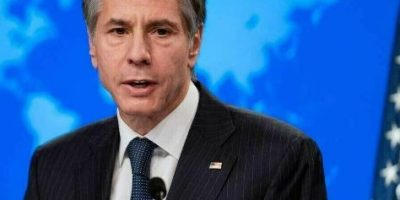E-bus, a Pak-China coop model to fight global warming and climate change.

Islamabad, July 24 (DNA): BYD China, the world’s leading electric vehicle manufacturer, has joined hands with Pakistan’s Sapphire Group for market development and manufacturing of electric vehicles in the country.
According to a Gwadar Pro’s report, the first electric bus was imported in Oct 2020 to Pakistan from BYD, and the E-bus has made its debut and started operations in Karachi in March this year.
Sapphire is running this bus in partnership on a 36 km two-way existing route. The idea is to scale up the number of EV buses to 100 in Karachi.
Talha Tariq, Project Manager (Business Development) Sapphire Energy Pvt, said that electric vehicles were introduced due to global warming and climate change.
“In Pakistan, we have introduced them and this is the future. This is a way to switch Pakistan from hydrocarbon fuel to electric vehicles for transport,” he said.
Since several months have passed after E-bus started operation, the 12-meter-long bus, with 35 passenger seats, has received positive feedback from local passengers.
According to a passenger, “The bus is air-conditioned and the handicapped with a wheelchair can easily sit here. It is a unique thing that we have not seen in other buses.
“As the climate of Karachi is very hot so there is AC in the bus. The mask and hand sanitizer are available on the bus. The service is good,” a passenger Mushtaq Ahmad said.
“There is no tiredness felt in it. There is no pollution of any type. There is no smoke, no diesel, no noise. It is such a silent vehicle that we perform our duty peacefully,” said Afaq Ahmad, an E-bus driver.
As per Sapphire Group, the operational cost is going to be lower than half of the routine buses running in Karachi. The bus has an improved capacity of 324 kWh (kilowatt-hours) and a range of 250 km in one charge with full load under regular city traffic. At a cost of Rs20/Kwh, the running cost will come at Rs26/km and will do six rounds in full charge.
As in Lahore, Karachi, Islamabad, Rawalpindi, there is transportation congestion going on, the way diesel buses are functioning is again being reviewed. Some believe the rise of E-bus in the city can be a solution to transport jams as well.
What E-bus has brought to Pakistan is more than a better life for locals. As Ahmed Jaudet Bilal, director of strategy and special projects, Sapphire Group, put it, “basically what we are trying to do is that we want to electrify the transport system in Pakistan as a strategy.”
Pakistan’s annual import of oil and gas accounts for about 80%. “If all 240,000 buses in Pakistan were changed into electric ones, it would save a lot of fuel, and the dependence on imports will be largely reduced. 40-50% of traffic emissions pollution can be lessened,” said Liu Xueliang, General Manager of Asia Pacific Auto Sales Division, BYD
With regards to renewable energy, Liu particularly mentioned the potential in solar energy. Pakistan enjoys sunlight more than 3,000 hours a year on average, with Baluchistan getting sunlight 8 to 8.5 hours per day, which stands out in global terms.
Liu also mentioned E-bus’s function as a tool for balancing power networks. Now the E-bus can run 250 to 300 kilometers on a full charge which requires about four hours.
As the country’s overall electricity usage is at a peak during the day and low at night, charging at night can help keep a balance, and in return can send out power when an emergency occurs.
“Thus the EVs not only affect your travel but also change living habits, providing a good tool for a comprehensive energy structure of the country,” he said.
Rather than offering a single product, BYD aims to provide a full range of technologies and products for national industrial development. “With electrified public transportation in place, a new ecological chain will be developed.”
“We have a plan to add more buses on our routes and other different routes as well. Similarly, we will look at Lahore, Peshawar, Sialkot, Multan, and other big cities and will start electric buses there,” he said.
Liu Xueliang, on the other hand, mentioned that after E-bus’s running for some time, they’ll adjust facilities according to market feedback. Besides, after-sales service such as spare parts supply and maintenance will be improved.
Related News

Blinken back in China seeking pressure but also stability
SHANGHAI, APR 24 (AFP/APP/DNA): US Secretary of State Antony Blinken returned Wednesday to China onRead More

China deeply concerned about Iran-Israel situation, calls for restraint
BEIJING, APR 14 (APP/DNA): China is deeply concerned about the current escalation of the Iran-IsraelRead More


Comments are Closed